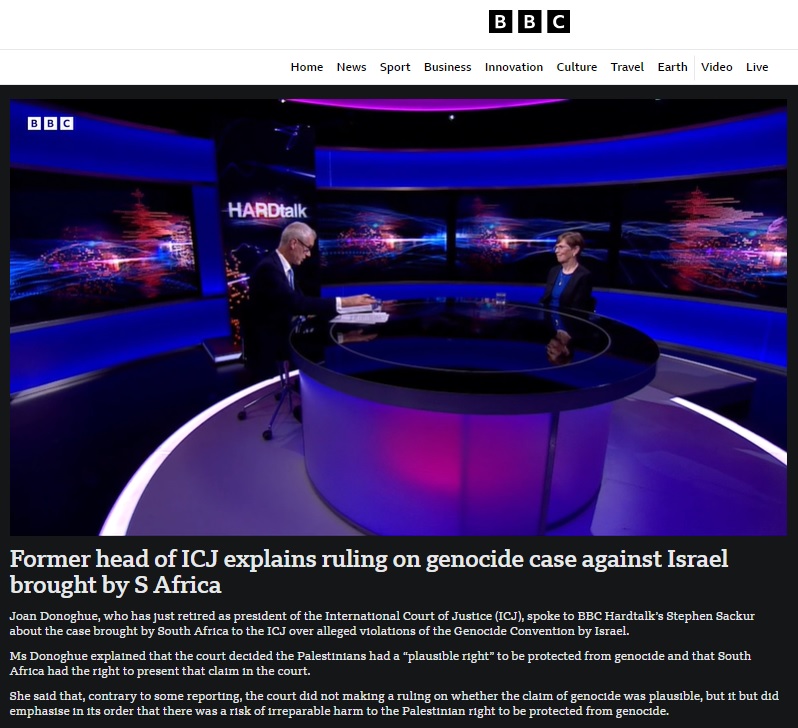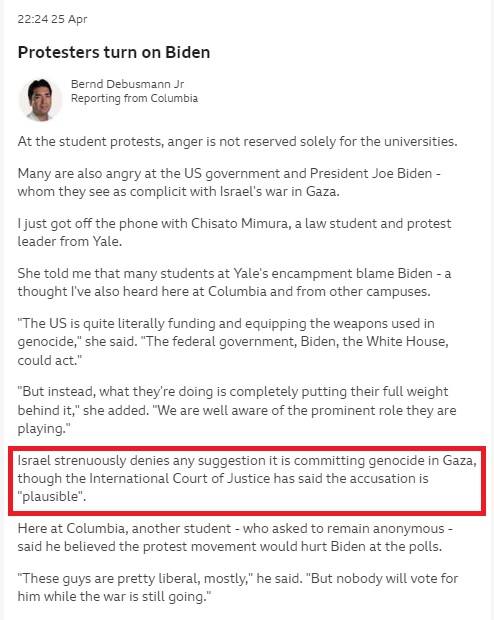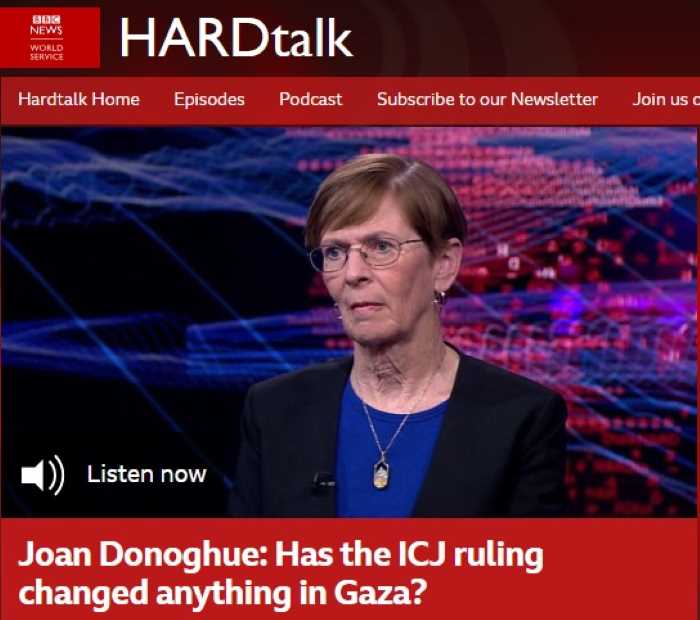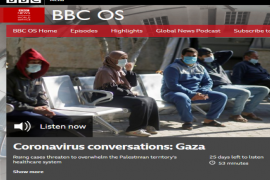On April 26th the BBC News website published a filmed item titled “Former head of ICJ explains ruling on genocide case against Israel brought by S Africa”.

The full filmed version of that April 25th edition of ‘Hardtalk’ is available in the UK here and the audio version aired on BBC World Service radio is here.
In that clip from the programme Stephen Sackur asks his interviewee the following question: [emphasis in italics in the original, emphasis in bold added]
Sackur: “…would it be fair to say that the key point — that you made your initial order and ruling upon — was whether or not there was a plausible case that should be taken on by the court of genocide in the case of Israel’s actions in Gaza after October 7 — and you quite clearly decided that there was a plausible case? Is it right to say that’s at the heart of what you decided?”
Ms Donoghue replies:
Donoghue: “I’m glad to have a chance to address that because the court’s test for deciding whether to impose measures uses the idea of plausibility — but the test is the plausibility of the rights that are asserted by the applicant, in this case South Africa. So the court decided that the Palestinians had a plausible right to be protected from genocide and that South Africa had the right to present that claim in the court.
It then looked at the facts as well. But it did not decide — and this is something where I’m correcting what’s often said in the media — it didn’t decide that the claim of genocide was plausible.
It did emphasise in the order that there was a risk of irreparable harm to the Palestinian right to be protected from genocide. But the shorthand that often appears — which is that there’s a plausible case of genocide —isn’t what the court decided.”
As noted by Joshua Rozenberg, such misrepresentations of the ICJ’s decision were not confined to the media but also appeared in a letter which was cited by the BBC in a supposedly factual backgrounder.
“An open letter to the prime minister and signed by 600 senior lawyers and former judges contains a disturbing error. The letter accuses the UK of failing to meet its obligations under the Genocide Convention.
In its third paragraph, the letter says that on 26 January 2024 the International Court of Justice “concluded that there was a plausible risk of genocide in Gaza”. […]
The words “plausible risk” appear nowhere in the court’s order. They are a misrepresentation of what the court concluded in paragraph 54 of its judgment…”
Now that Ms Donoghue has clarified that point to the BBC, it is clearly necessary for the corporation to correct its own misrepresentations of the ICJ’s decision, as well to issue clarifications concerning its reporting on such misrepresentations by others.
Examples of such misleading misrepresentations include the following: [emphasis added]
“ICJ says Israel must prevent genocide in Gaza” by Raffi Berg and Anna Holligan, January 26th 2024:
“The ICJ found it did have jurisdiction on the matter, and decided there was a plausible case under the 1948 Genocide Convention, and that the Palestinian population in Gaza was at real risk of irreparable damage.”
“Israel reined in by ICJ rulings on Gaza – but will it obey?” by Paul Adams, January 26th 2024:
“But even if the situation eases – and there’s no sign yet – the fact remains that Israel still stands accused of genocide, a case the ICJ believes is plausible and thus worthy of further detailed consideration.”
“Brother of aid worker killed in Gaza criticises arming Israel” by Harry Farley, Adam Durbin & Harrison Jones, April 5th 2024:
“Earlier, 600 legal experts wrote to the government saying weapon exports must end because the UK risks breaking international law over a “plausible risk of genocide” in Gaza. […]
The group add that the sale of arms and weapons systems to Israel “falls significantly short” of the government’s obligations under international law, given the “plausible risk of genocide” in Gaza – a situation that the letters [sic] says was highlighted in a provisional judgement issued by the International Court of Justice (ICJ) in January – and the worsening humanitarian situation since.”
“Israel-Gaza briefing: Obstacles to peace seem larger than ever after six months of war” by Jeremy Bowen, April 7th 2024:
“Evidence is accumulating that both Hamas and Israel may have committed war crimes. The International Court of Justice (ICJ) in The Hague is investigating Israel for “plausible” allegations of genocide against the Palestinians in a case brought by South Africa. The ICJ cannot try a case against Hamas, which is classified as a terrorist organisation by the US and UK, and many others, as it is not a state.”
“Columbia University: Pro-Palestinian protesters refuse to disband” by Brandon Drenon, April 23rd 2024:
“Israel strongly denies any suggestion that it is committing genocide in the Palestinian enclave, though the International Court of Justice has said the accusation was “plausible”.”
“House speaker Mike Johnson heckled by protesters in tense Columbia campus visit” by Bernd Debusmann Jr and Mike Wendling, April 24th 2024:
“Israel strongly denies any suggestion that it is committing genocide in the Palestinian enclave, though the International Court of Justice has said the accusation was “plausible”.”
“US college protests: Hundreds more arrested across US in Gaza campus protests” by Lipika Pelham, April 25th 2024:
“Israel strongly denies any suggestion that it is committing genocide in the Palestinian enclave, though the International Court of Justice has said the accusation was “plausible”.”
Live Page, April 25th 2024:

Even the synopsis to both versions of the Hardtalk interview with Ms Donoghue tells audiences that:
“In January, the court found there was a plausible case for Israel to answer for alleged violation of the Genocide Convention.”
CAMERA UK has submitted a complaint to the BBC on this issue.
Related Articles:






” It did emphasise in the order that there was a risk of irreparable harm to the Palestinian right to be protected from genocide.”
This is complete gibberish. As is the use of the meaningless word ‘plausible’, like ‘it is believed that’ (without ever mentioning by whom).
But the intention is perfectly clear: to place the words “Israel” and “genocide” in the same sentence -that’s all 99% of listeners/readers come away with.
There is NO genocide (2 million Palestinians living in Israel) and NO apartheid (except against Jews living in Judea and Samaria) in Israel. Simples !
When I moved to Israel (1991), I listened to BBC for a short time. I stopped after a serious program about religion, including the following story. It was about a divorce in Israel. The key point of the story an